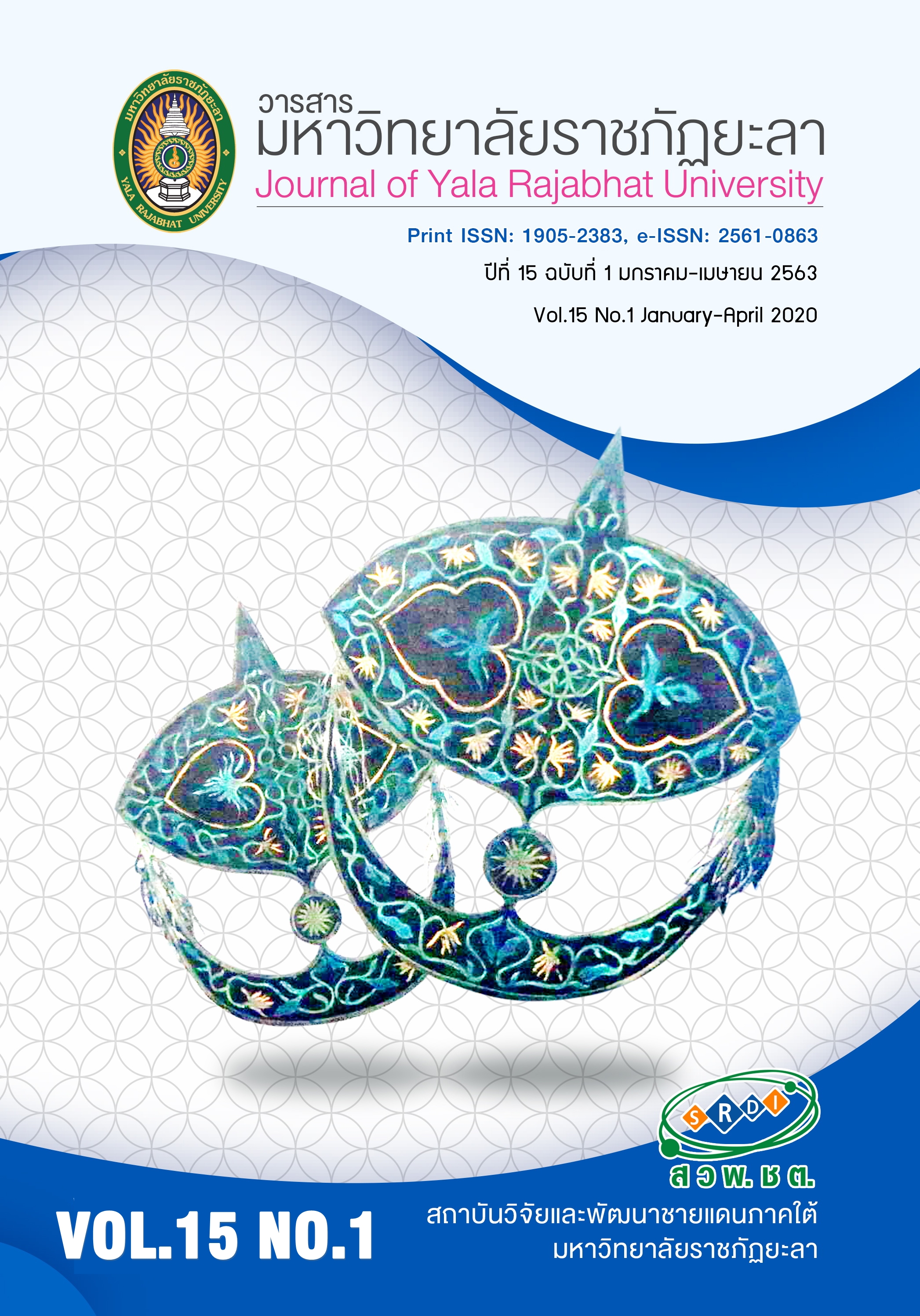การศึกษาความต้องการจำเป็นในการส่งเสริมสมรรถนะดิจิทัลของนักศึกษาวิชาชีพครู The Results of Data Analysis on The Need of Enhancement Pre-Service Teachers’ Digital Competence
Main Article Content
บทคัดย่อ
การวิจัยนี้มีวัตถุประสงค์เพื่อศึกษาความต้องการจำเป็นของสมรรถนะดิจิทัลของนักศึกษาวิชาชีพครู โดยการวิจัยครั้งนี้ดำเนินการ 3 ระยะ ได้แก่ ระยะที่ 1 ศึกษาเอกสารงานวิจัย ข้อมูลเชิงประจักษ์ และวิเคราะห์แนวคิดที่เหมาะสมสำหรับส่งเสริมสมรรถนะดิจิทัลของนักศึกษาวิชาชีพครู แหล่งข้อมูล ได้แก่ ฐานข้อมูลสืบค้นจำนวน 4 ฐาน ได้แก่ ProQuest Sage Journals, Google Scholar, Research Gate แหล่งข้อมูลเชิงประจักษ์ คือ จุฬาลงกรณ์มหาวิทยาลัย มหาวิทยาลัยมหาสารคาม และ มหาวิทยาลัยขอนแก่น และ ผู้เชี่ยวชาญ จำนวน 5 ท่าน เครื่องมือวิจัย ได้แก่ แบบประเมินความเหมาะสม ระยะที่ 2 สำรวจความต้องการในการส่งเสริมสมรรถนะดิจิทัลของนักศึกษาวิชาชีพครู โดยมีกลุ่มตัวอย่าง คือ อาจารย์ผู้สอนรายวิชาชีพครู เครื่องมือวิจัย ได้แก่ แบบสำรวจความต้องการส่งเสริมสมรรถนะดิจิทัลของนักศึกษาวิชาชีพครู และระยะที่ 3 วิเคราะห์ความจำเป็นของสมรรถนะดิจิทัลของนักศึกษาวิชาชีพครู เครื่องมือวิจัยคือแบบประเมินความสอดคล้อง ผลการวิจัยพบว่าสมรรถนะดิจิทัลของนักศึกษาวิชาชีพครู ประกอบด้วย 6 ด้าน ได้แก่ 1) ด้านการสืบค้นและการใช้งาน 2) ด้านการสร้างสรรค์และนวัตกรรม 3) ด้านเอกลักษณ์และคุณภาพชีวิต 4) ด้านการสอนและการเรียนรู้ 5) ด้านเครื่องมือและเทคโนโลยี และ6) ด้านการติดต่อสื่อสารและการประสานงาน จากการสำรวจระดับความต้องการในการส่งเสริมสมรรถนะดิจิทัลของนักศึกษาวิชาชีพครู พบว่าโดยรวมอยู่ในระดับมาก นอกจากนี้สมรรถนะดิจิทัลของนักศึกษาวิชาชีพครูยังมีความจำเป็นที่ต้องส่งเสริมให้เกิดขึ้นกับนักศึกษาวิชาชีพครูดังได้ระบุเป็นเชิงนโยบายไว้ในมาตรฐานวิชาชีพครู มาตรฐานคุณวุฒิ และมาตรฐานการศึกษาชาติ
Article Details
บทความ ข้อมูล เนื้อหา รูปภาพ ฯลฯ ที่ได้รับการเผยแพร่ในวารสารมหาวิทยาลัยราชภัฏยะลานี้ ถือเป็นลิขสิทธิ์ของวารสารมหาวิทยาลัยราชภัฏยะลา หากบุคคลหรือหน่วยงานใดต้องการนำทั้งหมดหรือส่วนหนึ่งส่วนใดไปเผยแพร่ต่อหรือกระทำการใดๆ จะต้องได้รับอนุญาตเป็นลายลักษณ์อักษรจากวารสารมหาวิทยาลัยราชภัฏยะลาก่อนเท่านั้น
เอกสารอ้างอิง
2. At the meeting of the President of Rajabhat Universities Nationwide. (2017). The new strategy of Rajabhat University to develop local according to the Royal Patronage. Bangkok: Ministry of Education. (in Thai)
3. Barell, J. F. (2006). Problem-based learning: An inquiry approach. Corwin Press.
4. Barkley, E. F., Cross, K. P., & Major, C. H. (2014). Collaborative learning techniques: A handbook for college faculty (3rd ed.). New York: John Wiley & Sons.
5. Bellanca, J. A. (2010). 21st century skills: Rethinking how students learn. United States: Solution Tree Press.
6. Bender, W. N. (2012). Project-based learning: Differentiating instruction for the 21st century. United States: Corwin.
7. Division of Research Administration and Educational Quality Assurance. (2017). Thailand 4.0 model drive of Thailand towards stability, wealth and sustainable. Bangkok: Division of Research Administration and Educational Quality Assurance. (in Thai)
8. Edwards, A. (2012). New technology and education. London: A&C Black.
9. Handley, F. J. (2018). Developing digital skills and literacies in UK higher education: Recent developments and a case study of the Digital Literacies Framework at the University of Brighton, UK. Publicaciones, 48(1), 109-126.
10. Huber, E., & Shalavin, C. A. (2018). Surveying the digital literacy landscape for academic and professional staff in higher education.
11. Jitlung, K. (2019). The desirable characteristics of teachers in 21st Century. Journal of Yala Rajabhat University, 14(1), 138-147.
12. Kolb, D. A. (2014). Experiential learning: Experience as the source of learning and development (2nd ed.). United States: Pearson Education.
13. Larkley, J. E. and Maynhard V. B. (2008). Innovation in education. New York: Nova Publishers.
14. Lips, M., Eppel, E., McRae, H., Starkey, L., Sylvester, A., Parore, P., & Barlow, L. (2017). Understanding children’s use and experience with F digital technologies Final research report.
15. Ministry of Education. (2018). Thai educational standard. Bangkok: Prime Minister's Office. (in Thai)
16. Ministry of Education. (2018). The qualifications framework for Thailand's higher education B.E. 2561. Bangkok: Prime Minister's Office. (in Thai)
17. Office of the Higher Education Commission. (2018). Announcement of guidelines for compliance with the national higher education qualifications framework for digital competency for undergraduate qualifications. (in Thai)
18. Sheehy, K., & Holliman, A. (Eds.). (2017). Education and new technologies: Perils and Promises for Learners. Routledge.
19. Skogen, K., & Sjovoll, J. (Eds.). (2010). Creativity and innovation: Preconditions for entrepreneurial education. Tapir Academic Press.
20. The Teachers’ Council of Thailand. (2013). Announcement of the Teachers Council of Thailand Board on the topic of knowledge, competency and professional experience of teachers Educational Manager Education Administrator and supervisors according to the Teachers Council of Thailand regulations on professional standards B.E. 2556. Bangkok: The Teachers’ Council of Thailand. (in Thai)
21. Williams, P. J. (Ed.). (2013). Technology education for teachers. German: Springer Science & Business Media.


